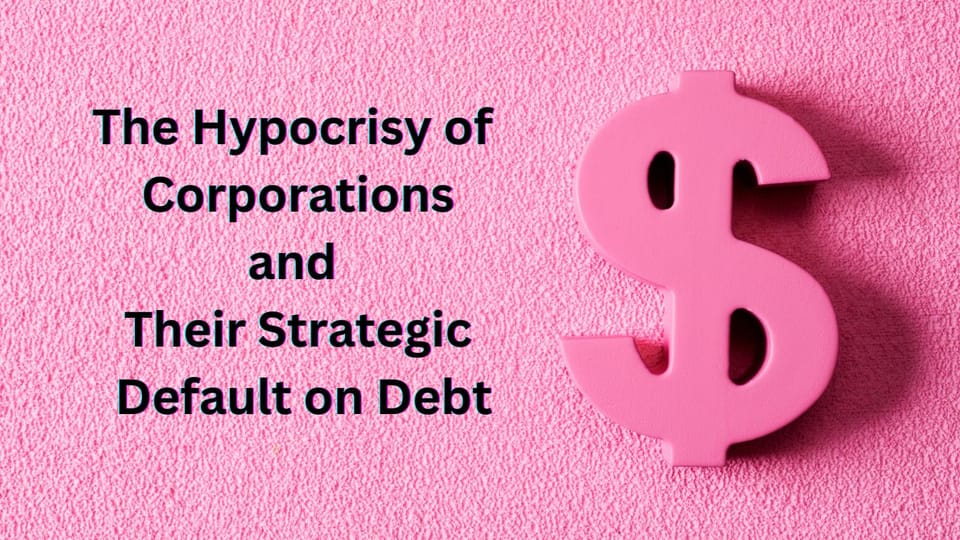The Hypocrisy of Corporations and Their Strategic Default on Debt

I saw a video recently on YouTube about BlackRock’s default on Hughes Center in Las Vegas, Nevada. BlackRock defaulted in March 2023 on a $323 billion dollar loan of the Hughes Center.
BlackRock said it had started writing down the value of the property several years ago, and completely wrote it off in early 2023. (Las Vegas Review Journal, December 18, 2023)
I am guessing they are using the term "write off" because they lost some money on the deal, but it seems to me that that the lender is the real loser here.
BlackRock is an alternative asset manager. Alternative assets are private equity, hedge funds, real estate and private debt. These assets aren’t considered traditional assets like stocks and bonds.
According to Forbes, BlackRock has about $12.5 billion in revenue, $41.1 billion in assets, and profit of $616.6 million in profit.
Isn’t it interesting how BlackRock has the money to pay this loan, but decided to stop paying?
It reminds me of the moral hazard argument during The Great Recession. Moral hazard is the idea that you have a moral obligation to pay your mortgage debt.
Have you noticed what the media does when it wants to influence public opinion? It creates "news articles" to influence the narrative and to subtly remind people that they should act in one way or another.
Fortunately, most of the public sees through these narratives. The most recent narrative is the increasing pressure to force people to return to the office. On any given day on Facebook, there are a whole bunch of articles with new angles on why people should just give up and go back to the office.
One reason they want everyone back in the office is to prop up commercial real estate. I find the whole narrative to be interesting. It's leading somewhere that I don't think employers really want to go. They are finding out that people will no longer tolerate their life force energy drained by these parasitic companies.
I recently wrote an article about how the wealthy are losing access to cheap borrowing costs and cheap labor. So many of the themes we hear about now are a result of losing access to something. Mostly the loss of access is by corporations but there are some other things going on.
It's a sure sign that someone is losing access because they will spin the narrative around and point the blame on anyone but themselves. For example, the narrative that "nobody wants to work anymore" which is utter bullshit.
And anyway – they should have thought about that before they shut the world down for two years and paid everyone to stay home and not work. Shutting down the economy had some real consequences that go much deeper than people seeing work as optional.
For many people, especially in lower paying jobs, one job isn't enough to cover basic expenses anymore. When that happens, what do you do? You find yourself making choices that you never would have considered before the pandemic.
But they will work hard to spin the narrative and blame the average person for not wanting to work. Just like they blamed homeowners who could not pay their mortgages after the banks made huge bets on mortgages that crashed the real estate market and caused a lot of harm to a lot of people. They blamed that on homeowners too.
During the Great Recession, I created a Google Alert set up for the keywords “strategic default.” If you're not familiar with Google Alerts, they are basically a free digest that gets e-mailed to you at a frequency you choose with a list of all the media that mention the keywords.
For at least two years, the public was barraged with dozens of articles each week about how homeowners were deadbeats and just didn't want to pay their bills. They were actively pushing the moral hazard idea – that you had poor morals for not paying your mortgage payment. In other words...you were a deadbeat loser for not paying your mortgage.
In retrospect, it all seems to be set up to take away massive amounts of wealth away from the people. We've had two major economic situations in a 20 year period that have resulted in a large amount of wealth being transferred from Main Street to the wealthiest people on the planet.
Yet, the moral hazard rules don't apply to corporations. They could pay their loan, but they decided it wasn't in their best interest to keep paying.
Where was the public shaming of a company who decided it didn't want to pay its bills?
That’s right…there isn’t any. That’s because it was NEVER about the moral hazard. It was all about the money.
This narrative infected the courts and the media had judges convinced that homeowners took out loans they couldn’t afford and just decided not to pay anymore.
The narrative ignored the fact that someone had to APPROVE those home loans, and that the reason they were approved is because the banks profited massively off of packaging and selling them off to investors.
It didn’t matter if the homeowner could pay – they weren’t going to hold the loans on their balance sheet. If the homeowner defaulted, it was someone else’s problem.
The hypocrisy in all of this is unbelievable.